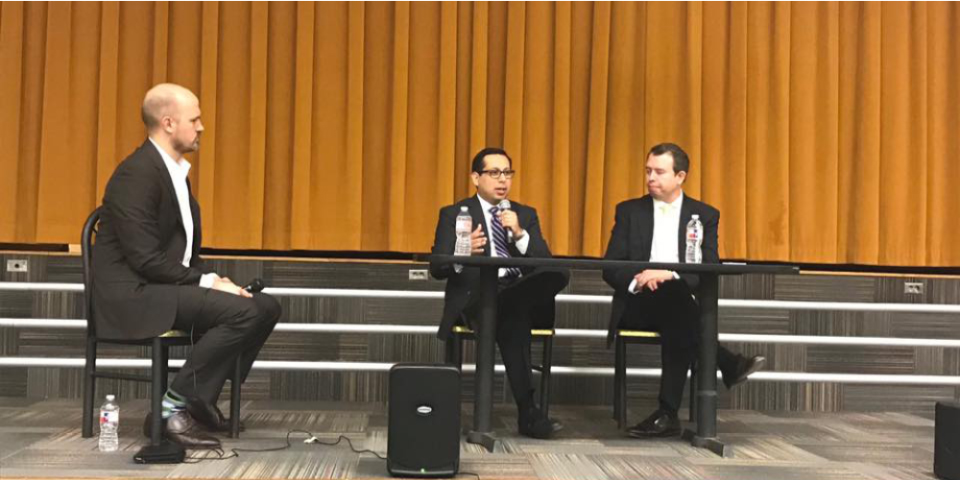
LSA 300 Class Day Focuses on Equity
We’ve all read recent reports that San Antonio is the most economically segregated city in the nation. But what does that mean? How did we get here? What do we, as leaders, do about it? And what exactly is the difference between equity and equality?
LSA 300 set out on its second class day with an eye-opening focus on Equity and the mission to answer those questions. The class examined the issue of equity and economic segregation through four specific areas – city policy, education, healthcare and the past. The day was capped off with a forward-looking discussion on how to build an equitable city.
Courtney Wai, Special Projects Manager with the city’s Office of Equity, started the day at the Eastside Branch of the Boys & Girls Club with an overview of the Equity Ecosystem, how government policies historically perpetuated economic segregation and inequity, and how the City of San Antonio is now working to reverse that. In short, equity means that policy-making, service delivery and distribution of resources account for the different histories, challenges, and needs of the people served. The city’s equity strategy for this fiscal year includes delegate agency funding through Human Services, SA Speak Up and the inclusion in the budget planning process, affordable housing planning through SA Tomorrow, innovation through the Smart Cities initiative, equitable distribution of street maintenance funding, and neighborhood engagement.
Before heading next door to the Martin Luther King Academy, the class heard from Development Director Sonia Lopez about how the how Boys & Girls Clubs are changing the trajectory of children in underserved communities. While 70 percent of the students in school districts served by the clubs are considered at risk of dropping out, 99 percent of members stayed in school, 99 percent of high school seniors graduated on time, and 94 percent of those seniors pursued higher education.
At the MLK Academy, Rep. Diego Bernal and SAISD Superintendent Pedro Martinez engaged in a candid conversation about equity in education moderated by Ryan Lugalia-Hollon, Executive Director of the P16Plus Council of Bexar County. “The good news is more people are graduating from high school in the history of this nation,” Martinez said. “But the bad news is, we have the largest gap in the percentage of kids from underserved areas attending and graduating from college.”
“This world is not kind to poor kids,” Martinez said, adding that children from a top quartile family have a 71 percent chance of graduating college, while it’s just 9 percent for children from bottom quartile families.
The next portion of the day focused on equity in healthcare with lunch served at the Robert B. Green campus of the University Health System. Owned by the residents of Bexar County, UHS also serves a 22-county area of South Texas. The Level 1 Trauma Center at University Hospital was a primary first responder facility for the victims of the Sutherland Springs mass shooting.
Beyond emergencies, UHS serves as the primary care resource for the region’s uninsured. “However, Medicaid is not sustainable,” UHS President and CEO George Hernandez said. “If we want to change the course of uninsured patient care, Texas needs to step outside of the box and create its own coverage option for lower income patients.”
After lunch and a birthday surprise for LSA 43 Steering Committee Co-Chair Denise Hernandez, the class moved to Trinity University to learn from Dr. Christine Drennon about the history behind San Antonio’s economic segregation that has led to so much inequity in public institutions.
To cap off the day and energize the class to action, SA2020 CEO Molly Cox led a discussion with the Honorable Henry Cisneros, former mayor and HUD Secretary under Pres. Bill Clinton. Cisneros’ most recent book, “Building Equitable Cities: How to Drive Economic Mobility and Regional Growth,” looks at place-based and people-based initiatives implemented throughout the country to advance equity.
“San Antonio has been a successful city because its leaders have been good at getting people to work together,” Cisneros said. Leadership San Antonio is excited to take on the challenge of continuing the task of working together toward a greater city of prosperity and security, for all of San Antonio’s citizens.
(Written by LSA class member Laura Jesse, Account Supervisor for KGBTexas)

